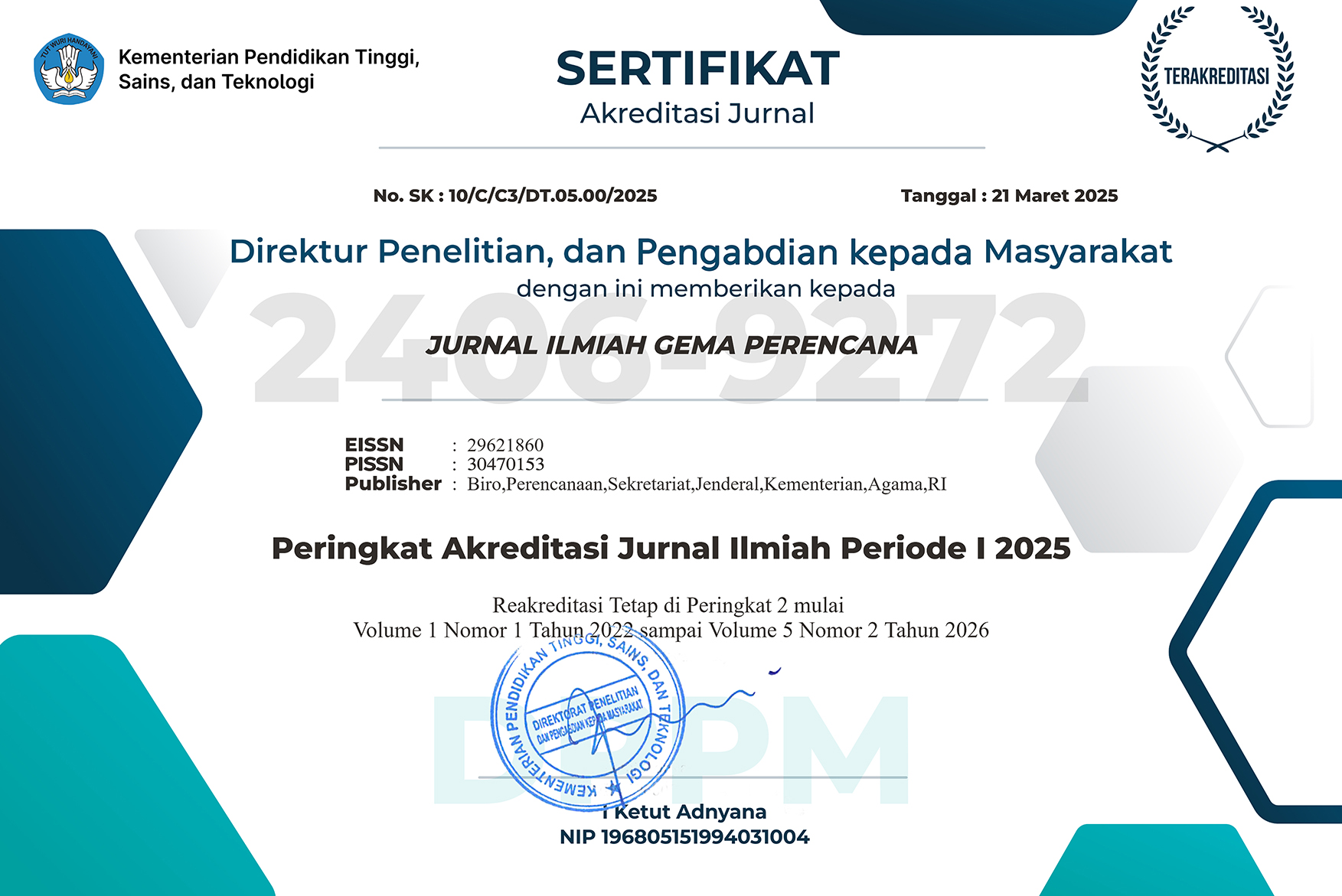Strengthening Moderate Religious Governance: Synchronization of Houses of Worship, Inter-Institutional Synergy, and Public Space in National Development
DOI:
https://doi.org/10.61860/jigp.v4i1.228Abstract
This policy paper explains that Indonesia as a multicultural country faces serious challenges in moderate religious governance. Although the constitution guarantees freedom of religion, reality shows that conflicts and discrimination are still rampant, especially in the establishment of houses of worship for minority groups. Inequality in the implementation of regulations, weak capacity of local governments, and minimal synergy between institutions are the main causes. This study uses a qualitative-descriptive approach method with policy studies as the main design, analyzed through the theories of incrementalism, capacity building, advocacy coalition framework, and collaborative governance. Data were analyzed from policy documents, institutional reports, and academic publications. The results of the study show that the Joint Decree of the 2 Ministers No. 9 and 8 of 2006 is often a source of multiple interpretations that open up discriminatory space. In addition, the FKUB has not carried out its mediation function effectively due to lack of training and dominance of one religious group. The study recommends revising the Joint Decree into a Presidential Regulation to strengthen legal legitimacy, accompanied by systemic training for regional officials and the establishment of an interfaith dialogue forum as an effort to build inclusive governance. This policy is expected to strengthen social harmony, guarantee religious justice, and accelerate civilized national development. A gradual and collaborative approach is key to the success of religious governance reform in Indonesia.
Downloads
References
Badan Litbang dan Diklat Kemenag. (2024). Pedoman Penataan Ruang Publik Inklusif.
Bruinessen, M. V. (2013). Contemporary developments in Indonesian Islam: towards a moderate consensus? In Leif Stenberg & Jonas Otterbeck (Eds.), Islamism and modernity: ideological and political discourse in the Middle East and North Africa (pp. 177-198). Routledge.
Cholil, S. (2023). Freedom of Religion amid Polarization and Religious Moderation Policy. Interreligious Studies and Intercultural Theology, 6(2), 196–204. https://doi.org/10.1558/isit.24603
Diamond, L. (1999). Developing democracy: Toward consolidation. JHU Press.
Dye, T. R. (2013). Understanding Public Policy (14th Ed.). Pearson
Grindle, M. S., & Hilderbrand, M. E. (1995). Building sustainable capacity in the public sector: What can be done?. Public Administration and Development
Hidayat, R. (2020). Lemahnya Implementasi SKB 2 Menteri dalam Pendirian Rumah Ibadah. Jurnal Hukum dan HAM
Human Rights Watch. (2018). "God Doesn't Like You": Discrimination and Violence Against Religious Minorities in Indonesia.
Kementerian Agama RI. (2020). Panduan Sertifikasi Penceramah Agama. Direktorat Jenderal Bimbingan Masyarakat Islam.
Kementerian Agama RI. (2020). Roadmap Moderasi Beragama 2020–2024.
Kominfo dan KPI. (2023). Standar Penyiaran Ramah Keberagaman.
Pagar, V. P., Akhyar, S., & Tunip, I. R. S. (2023). Religious Moderation in Indonesia: A Study on Implementation Patterns of the Indonesian Ulema Council (MUI). Inspirasi Futura: Media Kajian Keislaman. https://doi.org/10.31941/pj.v22i3.2756
Peraturan Bersama Menteri Agama dan Menteri Dalam Negeri Nomor 9 dan 8 Tahun 2006 tentang Pedoman Pelaksanaan Tugas Kepala Daerah/Wakil Kepala Daerah dalam Pemeliharaan Kerukunan Umat Beragama, Pemberdayaan Forum Kerukunan Umat Beragama, dan Pendirian Rumah Ibadah.
Putnam, R. D. (2000). Bowling alone: The collapse and revival of American community. Simon and Schuster.
Putra, I. G. N., Budiantara, I. W., Kusumaharani, I. A. A. W., & Sarono, S. (2024). The Role Of Religious Moderation In Political Dynamics In Indonesia. 1(3), 1–6. https://doi.org/10.62872/5sv1ey25
Qoumas, Y. C., Hussain, R. B. B. Mohd., & Rahim, R. A. B. A. (2024). The Dissemination of Religious Moderation Through the Policy of the Indonesian Ministry of Religious Affairs. Qudus International of Journal Islamic Studies, 12(1), 147. https://doi.org/10.21043/qijis.v12i1.27552
Rakhmat, J. (2006). Islam in Indonesia: Pluralism and tolerance. The Annals of the American Academy of Political and Social Science, 604(1), 166-177.
Setara Institute. (2023). Laporan Kebebasan Beragama dan Penyiaran Agama di Indonesia.
Singgih, E. (2023). Religious Moderation as Good Life: Two Responses to the Ministry of Religious Affairs’ Directive on Religious Moderation in Indonesia. https://doi.org/10.1163/1572543x-bja10038
Ujianto, A., Saridin, S., Mawardi, K., Mahmudah, S., & Sadari, S. (2023). State Intervention in the Establishment of the House of Worship to Realize Religious Harmony. International Journal of Social Science and Education Research Studies, 03(04). https://doi.org/10.55677/ijssers/v03i4y2023-04
Undang-Undang Nomor 32 Tahun 2002 tentang Penyiaran.
Wahab, M. R. N. F. (2022). Moderasi Beragama dan Dialektika Akademik: Tren Kajian Moderasi Beragama di Indonesia selama Covid-19. Nalar, 6(2), 137–159. https://doi.org/10.23971/njppi.v6i2.5365.
Wahid, A. (2024). Moderasi Beragama dalam Perspektif Pendidikan Agama Islam: Implementasi dalam Pendidikan Multikultural di Indonesia. 2(1), 29–36. https://doi.org/10.31959/js.v2i1.2367
Widyawati, F. (2023). Menilik Pembatasan Kebebasan Beragama dan Berkeyakinan dalam Perkawinan Beda Agama di Indonesia. Jurnal Ledalero. https://doi.org/10.31385/jl.v22i2.378.186-199
Downloads
Published
How to Cite
Issue
Section
License
Copyright (c) 2025 Ahmad Fakhrurraji

This work is licensed under a Creative Commons Attribution 4.0 International License.








